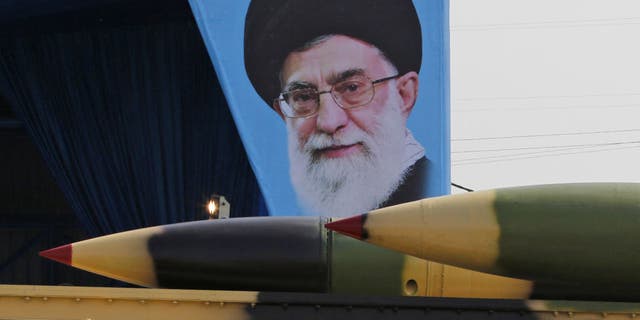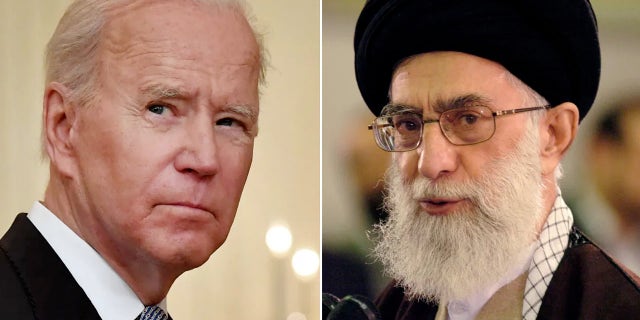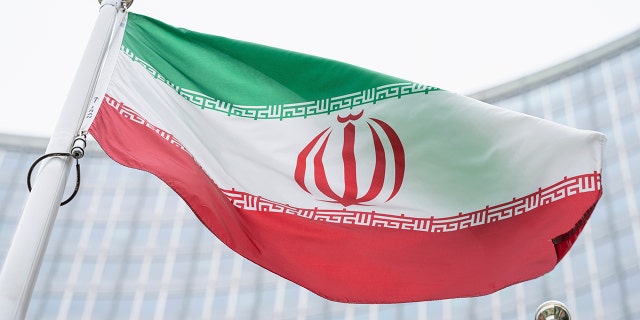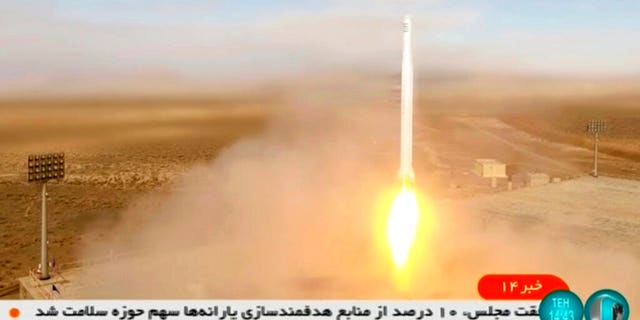JERUSALEM — The Biden administration is facing intense criticism for its reported willingness to pump $17 billion dollars into the coffers of the world’s worst state-sponsor of terrorism — the Islamic Republic of Iran — to reach a controversial deal to impose temporary restrictions on Iran’s illicit nuclear program and secure the release of American hostages.
“When Joe Biden was elected, Iran’s nuclear program was in a box, and their economy was in a downward spiral,” Sen. Ted Cruz, R-Texas, told Fox News Digital. “Biden looked the other way as the Ayatollah steadily advanced to nuclear weapons, and the regime resumed exports of millions of barrels of oil a day.
“All the while, Iran became Putin’s No. 1 military backer. Biden has already been funding both sides of the war in Ukraine, and so it would be appalling but unsurprising if he started openly sending billions more to the Ayatollah.”
Cruz’s criticism of Biden’s Iran policy follows a report in Iran International, a Washington D.C.-based independent news organization, that a deal might be imminent between the U.S. and Tehran over sanctions.
Sen. Ted Cruz, R-Texas, questions United States ambassador to the United Nations nominee Linda Thomas-Greenfield during her confirmation hearing before the Senate Foreign Relations Committee on Capitol Hill Jan. 27, 2021. (Michael Reynolds/Pool via AP)
IRAN REGIME CLOSE TO GETTING NUCLEAR BOMB, BUT WHAT’S THE HOLDUP?
In exchange for economic incentives reported to be $17 billion for the clerical regime, the rulers of Iran would release three American hostages and freeze certain aspects of their alleged nuclear weapons work.
According to the Iran International report, funds in Iraqi banks totaling as much as $10 billion (or more) could be funneled to Iran and would be linked to restrictions on Tehran’s illegal atomic program. Iraq purchases electricity and natural gas from Tehran, but it is prohibited by U.S. sanctions from transferring dollar payments to Iran.
Iraq is only permitted to transfer funds to Iran in Iraqi dinars. As a result of tough sanctions on Iran, Tehran can only use the dinars to buy merchandise from Iraq. Tehran views this system as a trade balance and maintains there is an outstanding Iraqi debt.
Iran’s ambassador to Iraq, Mohammad Kazem Al-Sadegh, told an Iraqi news outlet this year that Iraq owes Iran $11 billion for imports of gas and electricity.

An Iranian military truck carries surface-to-air missiles past a portrait of Iran Supreme Leader Ayatollah Ali Khamenei during a parade on the occasion of the country’s annual army day April 18, 2018, in Tehran. (Atta Kenare/AFP via Getty Images)
South Korea purchased $7 billion in Iranian oil prior to the imposition of comprehensive energy sanctions on Iran in 2019. The money is being held by South Korea.
When asked about the Iran International report and a new deal with Iran’s regime, a State Department spokesperson did not deny the report.
“Make no mistake: the United States of America will protect and defend its citizens,” the spokesperson told Fox News Digital. “To that end, we remain committed to securing the freedom of all U.S. nationals who continue to be wrongfully detained overseas, and we are working relentlessly to bring all wrongfully detained nationals home. We will not stop until they are reunited with their loved ones.”
IRAN UNVEILS LATEST VERSION OF BALLISTIC MISSILE AMID WIDER TENSIONS OVER NUCLEAR PROGRAM
“The United States should never spend one penny in ransom on payments to the world’s leading state sponsors of terrorism,” noted former State Department spokesperson Morgan Ortagus, who served during the Trump administration.
“Secretary Pompeo and President Trump brought two Americans home from Iranian prison without paying a cent. Giving Iran billions of dollars would only incentivize more hostage taking and lead more Americans and their families to suffer. And fuel more Iranian terrorism around the world.”

Morgan Ortagus, spokesperson for the United States Department of State, answers questions during a press conference in Washington Sept. 12, 2019. (Yasin Ozturk/Anadolu Agency via Getty Images)
President Trump withdrew from the Iran nuclear deal, formally known as the Joint Comprehensive Plan of Action, in 2018 because his administration argued it did not stop Tehran from building nuclear weapons and continued to permit Iran to fund terrorism and develop long-range missiles.
The State Department under both Republican and Democratic administrations has classified Iran’s regime as the world’s top state sponsor of terrorism.
IRANIAN PRESIDENT HACKED AS GROUP CLAIMS DATA SHOWS EXPANDED SECURITY AROUND NUCLEAR SITE
Asked about a Financial Times report from last week about secret meetings between Iran Special Envoy Rob Malley and Iran’s U.N. ambassador, U.S. State Department spokesperson Vedant Patel said on Monday, “We have the means to communicate with Iran and deliver messages to them that are in America’s interest to do so. We’re not going to detail the contents of those messages or the means of those deliveries.”
Middle East news outlets are also reporting on accelerated talks between the U.S. and Iran. The Israeli media outlet Haaretz on Wednesday reported that defense officials for the Jewish state believe a deal is moving at a fast pace, and an agreement could be reached within weeks. The newspaper wrote “some $20 billion in Iranian assets from frozen bank accounts” could be transferred to Iran’s regime.

President Biden and Ayatollah Ali Khamenei, Iran’s supreme leader (Biden Photo by Nicholas Kamm/AFP via Getty Images; Khamenei photo by Probst/ullstein bild via Getty Images)
The elements of the proposed deal would compel Iran to stop enriching uranium at high levels in exchange for significant sanctions relief. Iran’s regime was caught in early 2023 enriching near weapons-grade uranium purity for an atomic bomb.
There are also three U.S. nationals being held hostage in Iran — Siamak Namazi, Emad Shargi and Morad Tahbaz. A fourth hostage is Jamshid Sharmahd, a German citizen and long-term legal resident of California who was abducted by Iran’s regime in Dubai in 2020.
Iran’s regime sentenced journalist Sharmahd to death this year for alleged dissident activities in a show trial devoid of standard judicial norms, according to human rights groups.

The flag of Iran waves in front of the International Center building at the headquarters of the International Atomic Energy Agency, IAEA, in Vienna, Austria, May 24, 2021. (AP Photo/Florian Schroetter, FILE)
The Iranian regime-controlled Mehr News Agency reported Tuesday that Seyyed Mohammad Marandi, an adviser to Iran’s nuclear negotiating team, said, “The [nuclear agreement] text is basically ready and is awaiting both parties’ signature,” adding that “the time is ripe for the deal.
US, UK NAVAL SHIPS CHASE AWAY IRANIAN BOATS FROM ‘HARASSING’ MERCHANT VESSEL IN STRAIT OF HORMUZ
“If the Americans have the will, it could be signed quickly. But, again, Iran is not going to sit and wait. The world is changing, and Iran is using those opportunities to the utmost.”
Iran has turned a large sector of its economy into a war economy. The regime announced Tuesday it created the first domestically-made hypersonic ballistic missile.

Mahsa Amini was killed by Iran’s morality police, leading to massive anti-regime protests across the country. (Obtained by Fox News)
“It can bypass the most advanced anti-ballistic missile systems of the United States and the Zionist regime, including Israel’s Iron Dome,” Iranian state TV declared.
If the estimated $17 billion in frozen assets is released to Iran, it would come at a time when Iran is also in need of a financial shot in the arm to help finance repression of unrest in the nation. Starting in mid-September of last year, the country has been gripped by nationwide protests against the regime’s reported torture and murder of the 22-year-old Mahsa Amini.
Iran’s notorious morality police arrested Amini in Tehran for her alleged failure to cover her hair properly with a hijab. Her alleged brutal murder by the regime sparked outrage in Iran and across the world.

This image taken from video footage aired by Iranian state television March 8, 2022, shows the launch of a rocket by Iran’s Revolutionary Guard carrying a Noor-2 satellite in northeastern Shahroud Desert, Iran. (Iranian state television via AP)
CLICK HERE TO GET THE FOX NEWS APP
The demonstrations have tapered off, but the population is restive. And the regime desperately needs an infusion of cash to aid its vast security apparatus to counter new waves of protests, Iran analysts note.
Fox News Digital sent press queries to the Islamic Republic of Iran’s UN Mission in New York City and to its Foreign Ministry in Tehran.